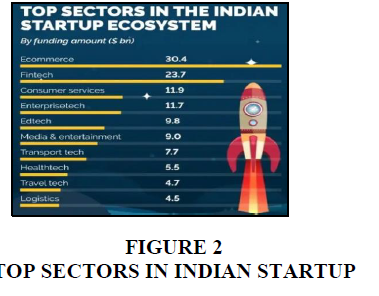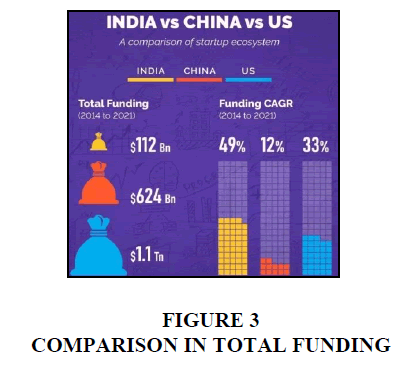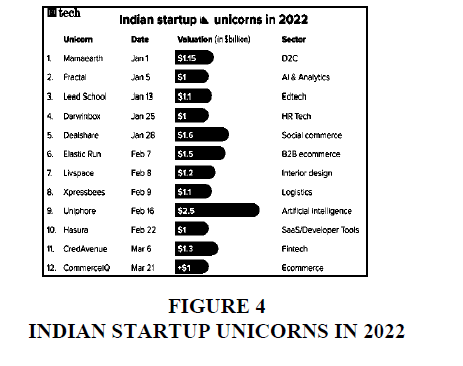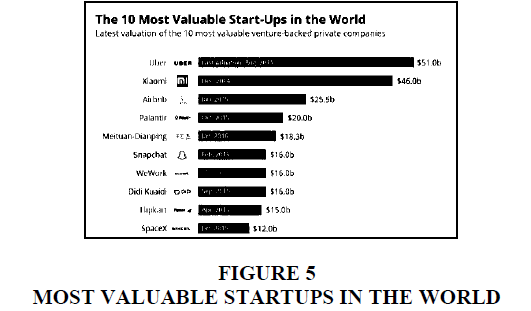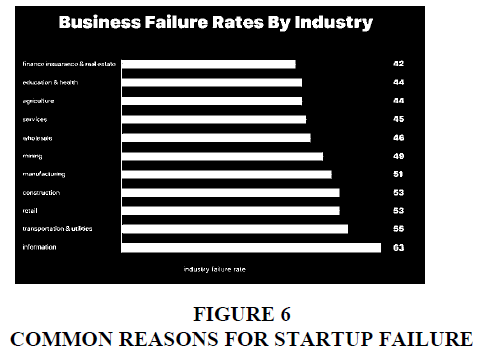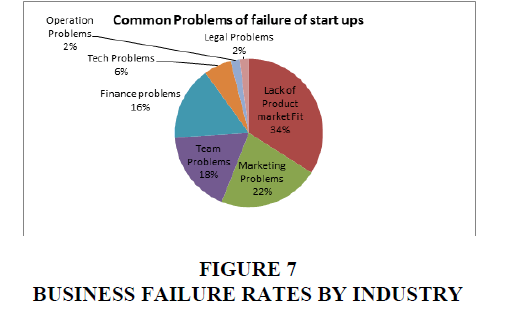Research Article: 2023 Vol: 15 Issue: 2
Startup schemes in India and related issues and opportunities-A review
Salauddeen Shaik, Geethanjali PG Studies
Radha Krishna Murthy G, Geethanjali PG Studies
Anil Kumar J, Zenex Vision Degree College
Mannem Samanth Kumar, Vikrama Simhapuri University
Citation Information: Shaik, S., Krishna Murthy G.R., Kumar J.A., & Kumar, M.S. (2023). Startup schemes in India and related issues and opportunities: A review. Business Studies Journal, 15(2), 1-14.
Abstract
Startup India scheme is a flagship initiative of presidency of India underneath the Ministry of commerce and enterprise. This scheme become first introduced by means of the Honorable prime Minister Shri Narendra Modi in his speech on 15 August 2015.The Startup India scheme targets to construct an eco-device for promoting innovation and design, sustainable financial growth and era of employment possibilities. As an initial step to this initiative, an intensive motion plan turned into launched by using the prime Minister in 2016 which provided for reforms that could help in boosting the start-ups.in India. The objectives of a begin-up are to be one’s very own boss and to create employment to others which warrants lot of persistence and sacrifice. Large populace with excessive percentage of income institution, educated teenagers with technical historical past, IT domination, and excessive net and mobile penetration are some of the drivers which have thrown up opportunities for spreading startup revolution in India. The ‘Make-in-India’ initiatives and different government schemes have additionally given a boost to startups with many people getting into the fray. Beginning a project is a properly-deliberate and disciplined exercise with due consideration of each internal and external elements that can impact the sustainability of the assignment. The idea in the back of the venture, marketplace size, revenue and earnings objectives are some of the crucial elements that want to be sincerely described earlier than embarking on the journey. Time, team works and tenacity are crucial elements which decide entrepreneurial fulfillment. Infrastructure, government guidelines and availability of finance at numerous ranges of increase might be a number of the demanding situations for startups. In fact, records are replete with examples of startups which started with massive fanfare but ended as damp squibs inside a quick span of time because of diverse motives. The paper discusses the begin-up scheme and additionally the challenges confronted by means of the Startups in India.
Keywords
Start Up, Economic Growth, Innovation, Entrepreneurship, Entrepreneur, Employment, Finance, Make in India.
Introduction
The Indian government on the way to promote marketers has commenced enforcing numerous tasks. on this admire, The Make in India scheme released by means of prime Minister Narendra Modi in 2014 supposed to boost the home manufacturing area and additionally increase the funding into the country in an effort to make the country number one within the startup subject, authorities of India (GoI) has brought a brand new marketing campaign referred to as startup India in 2015 which ambitions to sell entrepreneurship in particular amongst girls and to help startups with investment. Startup India is a flagship initiative of the authorities of India with the schedule to actively guide startups and marketers. The number one goal of the program is to create a strong ecosystem that nurtures and protects innovation and startups in India (Aggarwal, 2017).
The Honorable Prime Minister Shri Narendra Modi had stated that, “I see startups, era and innovation as exciting and powerful instruments for India’s transformation.” Startups have performed an essential position within the boom, development and industrialization of many nations across the world.
Producing big-scale employment opportunities and main to the sustainable monetary growth of the country (Jain, 2016). Ultimately, the Indian authorities additionally launched the Aatmanirbhar Bharat assignment and the Make in India program, with the aim of reworking India right into a global production and layout export hub. For this reason, Startup India scheme is all approximately selling entrepreneurship in India. With a big variety of younger populace who're now looking to emerge as entrepreneurs with the huge and progressive commercial enterprise thoughts in their minds, once in a while sense discouraged because of the lack of capabilities, inadequate government support, lack of funding help, excessive regulatory compliances and so on (Nidhan, 2018).
Today, India boasts of being the 1/3-largest startup environment across the globe. The country has over one hundred unicorns and greater than 60,000 startups running within the territory. This fulfilment may be in part attributed to the lively aid furnished via the Indian authorities to startups and entrepreneurs via its various schemes and programs. All the aforementioned applications have been observed by way of various government schemes and assets to offer financial assistance and running capital to startups (Pandita, 2017). For example, startups are eligible for an expansion of blessings below the Startup India action Plan, together with tax incentives and exemptions, loans at reduced interest prices, ability development programs, prioritization of startups in public procurement, and many others. These text goals to cowl few of the numerous schemes released with the aid of the Indian authorities (Chaudhary, 2015).
Objectives of Study
1. To review the startup eco system in India.
2. To study about different schemes in India
3. To study the Government Initiatives.
4. To study the Startup India scheme.
5. To study the challenges faced by the start up in India.
6. To study the Opportunities to the youth of India due to the startups.s
Research Methodology
The study is based on the secondary data which has been collected through journals, magazines, newspapers, research papers, and websites and so on.
Government Initiatives
Indian government is serious in promoting entrepreneurship at the startup level and has taken a number of initiatives to ensure appropriate support. In this aspect it is relevant to mention Aatmanirbhar Bharat mission “Make in India” campaign introduced in September 14 to attract foreign investments and encourage domestic companies to participate in the manufacturing sector. The government increased the foreign direct investment (FDI) limits for most of the sectors and strengthened intellectual property rights (IPRs) protection to instill confidence in the startups. In order to make the country as number one destination for startups, Government of India (GoI) has introduced a new campaign called “Stand-up India” in 2015 aimed at promoting entrepreneurship among women and to help startups with bank funding. Another commendable and far reaching initiative is “Digital India” introduced in 2015 to ensure government services are made available to every citizen through online platform that aims to connect rural areas by developing their digital infrastructure which translates into a huge business opportunity for startups.
The Startup Scheme in World
India stood in the second place in the world with 105 Unicorn companies and USA leading in the top position with 618 unicorn companies (Figure 1). Top Sectors that contribute in the Startup Ecosystem are Ecommerce, Fintech, Consumer Services, Enterprise tech, Editech, Media & Entertainment, Transport tech, Health Tech, Travel Tech and Logistics. While coming to the Funding USA stands in first place with Total Funding of 1.1 Trillion Dollars, China with 624 Billion Dollars and India with 112 Billion Dollars (Figure 2 & 3).
The Startup Scheme in India
The Economic survey 2021-22 recognized around 61,400 start ups in India, just proving that startups in India have been increasing considerably over the past years, all thanks to the Startup India scheme and the benefits it provides. As per the Economic Survey 2020-21, the government has recognized around 41,000 startups in India. In 2020, the country had around 12 unicorns despite the economic disruption created by COVID 19.
According to a recent report by market intelligence provider Tracxn, 14 Indian companies have already turned unicorns in the first half of 2022; India is currently ranked third in overall unicorns created with U.S.A in the first place. There are some of the businesses that joined the list of unicorns in 2022 (Figure 4).
Mamaearth, Fractal Analytics, Lead School, Darwin box, Deal Share, Elastic Run, Livspace, Xpress bees, Uniphore, Hasura, Cred Avenue, CommerceIQ and so on. The Minister of Commerce and Industry, Mr. Piyush Goyal had stated that Indian start up eco system should aim to raise 75 unicorns in 75 weeks to mark the 75th anniversary of Independence. The country had already witnessed 10 unicorns in the first 53 days of the year but due to reasons like Russia war, recession fears, mass layoff of work force etc. the funding started to decline in the Indian eco system of startups.
It is to be noted that every year more than 800 technology startups are being set up in India. By 2020, it is estimated that around 11,500 tech-startups are going to be established with employment potential of around 250,000 technical people. It is admirable to note that India is amongst the top five countries in the world in terms of startups with 10,000+ led by US with 83,000+ comprising 43% tech-based firms with 9% managed by women entrepreneurs. The number of incubators also has crossed 100 in 2014-15 to give boost to the startup Sector wise, the distribution of Indian businesses is (Figure 5):
India’s Growth in Startup Ecosystem
As per the NASSCOM tech start up report 2021- Year of Titans, 2021 was the year of unparalleled growth in the Indian tech start up eco system. Key findings of the report:
1. 2250+ tech startups founded.
2. 42 unicorns added which is 3.5 times higher than last year.
3. $ 24.1 billion funding rose which is three times higher than last year.
4. 10-15% of the tech startups have at least one women founder/ co-founder.
5. 29% of all technology startups based outside established hubs.
6. Higher corporate and investor participation.
Startup India Scheme
A Start up is an entity that is incorporated or registered in India which has been in existence for less than 5 years, with an annual turnover of not more than Rs 25 crores in any preceding financial years and which is involved in the development or innovation or commercialization of new products and services that are driven by technology or intellectual property. Eligibility for Registration under Startup India Scheme:
1. The company should be a private limited company or a Limited Liability Partnership.
2. It should have obtained approval from the Department of Industrial Policy and Promotion.
3. It should have a recommendation letter by incubation.
4. It must be involved in providing or developing innovative products or services.
5. It must be in existence for less than 10 years.
6. The turnover of the company should not be more than Rs. 25 crores.
7. It should not be the result of splitting up or reconstruction of a business already in existence.
In order to meet the objectives of the Startup India scheme, the Government of India has announced an action plan that covers all the areas of the startup eco system. The Action Plan is divided in 3 areas:
1. Simplification and Handholding.
2. Funding Support and Incentives.
3. Industry-Academia Partnership and Incubation.
Key Points of the Startup India Scheme
Compliance regime based on self-certification: The objective of this is to lessen the load of compliance at the startups thereby enable them to recognition on their business. This self-certification will apply to laws like payment of gratuity, settlement hard work, employees’ provident fund, water and air pollution acts.
Startup India hub: The goal of this is to create a single factor of contact for the complete eco system of startups thereby enables knowledge exchange and access to investment.
Introduction of mobile App and portal: Through the cell app, startups can accelerate the procedure of submitting registration, view the registration status, filing for compliances, acquiring records on registration, approvals, apply for numerous schemes underneath the motion plan and collaborate with numerous partners and so on.
Fast tracking of patent examination: The objective is to rapid track the patent application cases, installation a panel of facilitators to assist in filing of patent programs, offer rebate on filing utility.
Relaxed norms of public procurement for startups: In order to offer an equal possibility and standing to the startups in the production quarter in evaluation to the established players, the authorities shall exempt startups (in the manufacturing region) from the criteria of “previous revel in/ turnover” without any rest in satisfactory standards or technical parameters.
Faster exit route: It isn't always that each startup will succeed; it's miles feasible that the startups may fail. on the way to make the exit clean, the authorities has even simplified the winding up method of the startups which would allow them to reallocate the capital and the sources invested earlier to get reinvested in a few different productive areas. Other points.
1. 2500 Crore Funds every year for Startup India Campaign.
2. Credit Guarantee Fund-500 Crore/Year.
3. Total of 10000 Crore Funds for Next 4 years.
4. No Government Inspection for 3 Years.
5. Special Scheme for Women Entrepreneurship.
Atal Innovative Mission provides for National Recognition Award to be given for best innovative startup and Seed Capital Fund for startup.
Startup Schemes in India
ASPIRE-A Scheme for Promotion of Innovation, Rural Industries and Entrepreneurship: This scheme was introduced to set up a network of technology centres and incubation centres across India with the objective to accelerate entrepreneurship and encouraging innovations for unmet social needs in the agro-business industry. It provides financial aid for setting up livelihood business incubators and/or technology business incubators, by way of one-time grant of 100% (hundred percentage) cost of plant & machinery (apart from land and infrastructure) or a sum up to INR 100 (Indian rupee hundred) lakhs, whichever is less.
In India, a large portion of the population is still dependent on agriculture for their livelihood and a substantial number of Indians live in rural areas. As such, this scheme was launched with the purpose of generating employment and establishing enterprises in the agriculture industry. It provides knowledge to entrepreneurs for establishing their own businesses, to emerge as employers, and to ensure their self-sustainability. This program intends to foster district-level economic growth from the ground up.
Pradhan Mantri Mudra Yojana: Under this scheme, Micro Units Development and Refinance Agency Ltd. (MUDRA) is a non-banking financial company which supports development of micro enterprise sector in India. MUDRA provided refinance support to banks and/or microfinance institution for lending to micro units who have loan requirement up to INR 10 (Indian rupee ten) lakhs. The loans have been divided into categories of Tarun, Kishore, and Shishu, depending on the stage of development, funding needs and age of the business and the amount of loan that can be availed by these businesses. There is no collateral security for these assets and loans up to INR 10 (Indian rupee ten) lakhs can be provided to small businesses which are non-corporate and non-farm micro or small enterprises. This loan is granted for a variety of activities which provide income generation and employment creation. It is mostly offered to street vendors, store owners, traders, and other service providers. Additionally, working capital, travel vehicle, and working capital loans are offered. Thus, it is a unique scheme that is devised to empower Indian entrepreneurs.
Support for International Patent Protection in Electronics and Information Technology (SIP-EIT): The SIP-EIT scheme was launched by the Department of Electronics and Information Technology (DeiTY) with the aim of providing government funding to technology startups and Micro Small and Medium Enterprises (MSME) in India for filing international patents. This encourages innovation, builds brand recognition, and recognizes the importance and potential of having global intellectual property protection. The financial assistance is provided to the information communication technologies and electronics sector. The eligible entities can apply for this scheme at any stage of the international patent filing process. The reimbursement limit is set at either 50% (fifty percent) of the total expenses incurred during filing and processing of the application, or INR 15 (Indian rupee fifteen) lakh for every invention, whichever is lesser.
Multiplier Grants Scheme (MGS): This scheme was again launched by DeitY with the objective of encouraging industries to collaborate with premier academic and government R&D institutions for the development of packages and products. This would strengthen the link between industries and institutes, accelerate the development of indigenous products and packages, and bridge the gap between proof-of-concept and globalization. Under this scheme, if an industry supports the R&D of products that are capable of commercialization, the government would provide funding up to twice the amount provided by that industry. The grant amount for an individual industry is restricted to 2 (two) crores per project and the preferred duration of each project is less than 2 (two) years. For a consortium of industries, the granted limit is 4 (four) crores with the duration of 3 (three) years.
Credit Guarantee Fund Trust for Micro and Small Enterprises (CGTMSE): To implement the Credit Guarantee Fund Scheme for Micro and Small Enterprises (MSE), the Ministry of MSME, the Government of India, and the Small Industries Development Bank of India (SIDBI), established the Credit Guarantee Fund Trust for Micro and Small Enterprises (CGTMSE). This scheme strengthens the credit delivery system and facilitates flow of credit in the MSE sector. It provides loans at highly subsidized rates and with zero collateral to startups, small-scale industries, and micro-level businesses. The scheme covers fund and non-fund-based credit facilities up to Rs. 200 lakhs for every eligible borrower and the funds are dispersed by the SIDBI. The scheme is primarily for service or manufacturing businesses and the loan can be availed in the form of a term loan or working capital.
Single Point Registration Scheme (SPRS): SPRS is a developmental scheme managed by the National Small Industries Corporation (NSIC) for supporting MSE. Undoubtedly, the Indian government is the single largest purchaser of a large array of goods. The objective behind this scheme was to increase the number of purchases from the small-scale sector. By opting for this scheme, NSIC registers the eligible MSEs for participation in government purchases without any Earnest Money Deposit (EMD), which is the money taken from bidders before they place any bid, as a security deposit for ensuring their seriousness in the project. Thus, under SPRS, MSEs having an NSIC registration will be exempt from paying the EMD. Further benefits include advantages in tender participation, free of cost tender, and procurement from MSEs. As an additional benefit, 358 (three hundred and fifty-eight) categories of goods are reserved for being purchased exclusively from the MSEs and the government has also prescribed a minimum limit of 25% of the total yearly purchases made by central ministries, departments, and public sector undertakings from MSEs only.
Extra Mural Research or Core Research Grant (CRG): CRG was originally named Extramural Research funding scheme. It was launched more than four decades ago, after the establishment of the Science and Engineering Research Board (SERB) but continues to be one of the most relevant and useful schemes. The objective of CRG is to help research labs, academic institutions and other R&D organizations carry out research in all frontier fields of science and engineering. Thus, it encourages upcoming and eminent scientists for an individual-centric competitive method of research funding.
High Risk and High Reward Research: This scheme aims to support and invite new ideas and proposals which carry the potential to have a broad impact in the domains of science and technology. It lays emphasis on proposals that are new and risky, but if successful, can be highly rewarding for the field of science. Such proposals may include theoretical and experimental advances, challenges to existing hypotheses, scientific breakthroughs, an out of the box solution for an important problem, or the formulation of a new hypothesis that brings about new technologies (Pandey, 2022). There is no prescribed budget limitation for these projects and the research grant shall cover consumables, contingencies, equipment, and travelling costs apart from the overhead grants. The funding is provided for 3 (three) years which may be extended to 5 (five) years in exceptional cases.
Design Clinic Scheme: The Indian government has recognized the importance of innovation and design in the growth of any brand and decided that every MSME and startup should build a design-centric approach for fuelling their startup. In order to encourage small businesses to experiment with new and innovative designs for their goods, the Ministry of MSME established the Design Clinic scheme to create a sustainable design eco system through on-going training and skill development. Under this scheme, the government shall extend up to INR 60,000 (Indian rupee sixty thousand) for attending seminars on design and up to INR 3.75 lakhs or 75% (seventy-five percent) of the seminar’s cost, where the seminar is conducted by the startup or MSME. By virtue of this program, it is expected that entrepreneurs and leaders would get an opportunity to learn about the latest practices and trends pertaining to designs, network with other innovators and designers, learn design theories and increase the local competitiveness of their products using designs.
Zero Defect Zero Effect (ZED) scheme: This mission seeks to motivate manufacturers to create better products, have zero defects and high quality, as the name suggests. It is a handholding scheme that provides an opportunity to MSMEs to embrace world-class manufacturing processes, use new technology and consistently improve their products. The scheme provides tools, technology as well as financial assistance to startups and MSMEs for ensuring zero defects in their goods. ZED also offers a holistic certification, assesses enterprises for ZED, and supports startups in climbing up the maturity assessment model of the scheme.
Issues and Challenges of Startups
A successful start-up cannot start a business just with passion and an idea. A high level of leadership skills with clear understanding of market, excellent communication skills, maturity to see things in right perspective along with the ability to take calculated risks are required on the part of the entrepreneur. Lack of awareness, multiple clearances, unorganised market, poor infrastructure in Tier 2/3 cities, lack of mentoring , stringent exit policies, corruption/red tape, technological risk, regulatory obstacles and lack of reforms keeping pace with the fast evolving market changes are some of the challenges as per Rashmi Guptey, Principal (Legal) of Lightbox India Advisors Private Limited.
Some of the major issues and challenges are discussed below: Lack of adequate funds: Funding is a critical component for the startups. Finance is needed in the very preliminary section for growing the product, hiring the proper personnel, development in generation, branding, advertising, and many others. The requirement increases as the enterprise grows. In India, the world of funding remains complex and hard as there is a loss of risk taking buyers.
Regulations: Some of regulatory compliances should be made by using the startups in particular for the duration of the initial stages can make the founders awareness less on their middle enterprise. The startup Scheme has eased out on a few policies, however nevertheless it has now not ended all of it.
Passing the test of Innovation: The scheme gives that each start up wishes to clear the take a look at of innovation in which The Inter Ministerial Board will take a look at whether or not the startup is innovative and unique. Most start up can also fail this test as each product/provider may have specific commercial values (Skok, 2016). The startups have the functionality of employment generation, creation of latest merchandise and IPR, then why the Inter Ministerial Board will determine on the viability of the startups?
The definition of the startup supplied through the authorities affords that those merchandise/services that can't be commercialized aren't included within the definition of startups. This very point excludes many startups.
Limited mentorship: Among the startups have terrific commercial enterprise thoughts in their minds however do now not have the essential enterprise and marketplace information and for this reason they fail in the execution and implementation. Loss of mentoring can be one of the unaddressed challenges of the startups.
Fewer taxation benefits: The startup India scheme has supplied tax benefits for growing patents. Patent creation takes a lot of time. No tax holidays have furnished to the startups of their preliminary years.
Financial Resources: Availability of finance is important for the startups and is continually a trouble to get enough quantities. Some of finance options ranging from circle of relatives members, friends, loans, grants, angel investment, assignment capitalists, crowd funding and so on are to be had. The requirement starts increasing because the commercial enterprise progresses and Scaling of enterprise calls for well-timed infusion of capital. Proper cash control is important for the achievement of the startups. A recent record paints a depressing photograph with 85% of recent agency’s reportedly underfunded indicating capacity failure.
Revenue Generation: Several startups fail because of terrible revenue generation as the enterprise grows. As the operations boom, prices develop with decreased revenues forcing startups to concentrate at the funding issue, therefore, diluting the focal point on the fundamentals of business (Griffith, 2014). Therefore, revenue era is vital, warranting efficient management of burn price which in not unusual parlance is the fee at which startups spend money inside the initial degrees. The task isn't to generate enough capital however also to amplify and sustain the growth.
Team Members: To find and hire the right kind of talent for the business with skills to match growing customer expectations are one of the biggest challenges. Apart from founder(s), startups normally start with a team consisting of trusted members with complementary skill sets. Usually, each member is specialized in a specific area of operations. Assembling a good team is the first major requirement, failure to have one sometimes could break the startup. According to a survey, 23 percent startups failed because members did not work as a team. Chirag Garg, CEO, HyperDell, feels that bringing in affordable talent at the right time is a challenge. As per Nitin Sharma, Principal & Founding member, Lightbox India Advisors Private Limited “Hiring and retaining high quality talent, especially in the areas of product and technology remains a key challenge”.
Supporting Infrastructure: There are a number of support mechanisms that play a significant role in the life cycle of startups which include incubators, science and technology parks, and business development centres etc. Lack of access to such support mechanisms increases the risk of failure.
Creating Awareness in Markets: Startups fail because of lack of attention to obstacles in the markets. The environment for a startup is usually greater tough than for a long time company due to distinctiveness of the product. The situation is greater difficult for a new product because the startup has to build the whole thing from scratch.
Exceed Customer Expectations: The following most essential task is gauging the market need for the product, present developments, and so on. Innovation performs a crucial role, given that, that the startup has to satisfactory-tune the product services to match the marketplace demands. Additionally, the entrepreneur ought to have thorough domain information to counter opposition with appropriate strategies. Because of new technologies which are emerging, the task to offer over and above an earlier innovation is pertinent (Derek, 2016). Namrata Garg, Director, SendKardo feels that the most important task is the want to continuously reinvent yourself and come up with a service that allows you to healthy up customer expectations and exceed them.
Tenacity of Founders: Founders of startups ought to be tough whilst the going receives difficult. The journey of starting a project is fraught with delays, setbacks and troubles without adequate solutions. The entrepreneur needs to be persistent, persuasive, and have to in no way give up until he/she achieves desired consequences. History is replete with startups who gave up the fight while matters went wrong. On occasion the product might be in advance of its time or may also require complimentary technology /products for the use with the aid of the customers.
Regulations: Starting a business calls for a number of permissions from government agencies. Even though there is a perceptible alternate, its far stills a mission to register a corporation. Rules bearing on labor laws, intellectual property rights, dispute resolution etc. are rigorous in India which takes about 30 days to comply in comparison to simply nine days in OECD countries? Additionally, as in step with global financial institution record, “global financial institution Ease of Doing commercial enterprise”, India ranks 142 out of 189 economies.
Growth Decelerators: Some of the organizations which are part of the startup atmosphere themselves can every now and then turn out to be hurdles in the growing tiers. As per Sneh Bhavsar, co-founder and CEO, O/o Womaniya one of the main troubles is the effect of incubators, institutes and comparable organisations which attempt to manage, manipulate and be the daddies of the start-ups within the name of helping, mentoring and so forth. This desires proper coordination the various companies for mutual advantage.
Lack of Mentorship: Milan Hoogan, vice president-sales and advertising at Erfolg life Sciences feels that lack of proper steering and mentorship is certainly one of the largest issues that exist inside the Indian startup ecosystem. Maximum of startups have wonderful thoughts and/or products, but have little or no industry, enterprise and marketplace experience to get the products to the market. It is a demonstrated instance that a super concept works best if finished directly. Lack of good enough mentoring/guidance is the largest assignment which could deliver a probably correct concept to an end.
Lack of a Good Branding Strategy: Absence of an effective branding strategy is another issue that prevents startups from flourishing at a faster pace. Hemant Arora, Business Head-Branded Content, Times Network opines that branding demands paramount attention as it gives an identity and occupies a space in the consumer minds.
Replicating Silicon Valley: Koushik Shee, Founder and CEO, Effia, feels that Indian startups get influenced by Silicon Valley models which may not succeed in Indian scenario (Chaudhari, 2017). Lot of tweaking and modifications could be required when transplanted into Indian markets keeping in mind Indian infrastructure in terms of roads, internet, electricity and telecom penetration (Hallur & Sane, 2018).
Reason for Failure
As regards major reasons for failure of startups, a survey based on analysis of 80+ failure firms showed that 34% is failed due to lack of product Market fit, 22% failed due to the Marketing Problems, 18% due to Team Problems, 16% Financial Problems, 6% due to technical Problems, 2% is due to operational problems and 2% due to Legal Problems (Figure 6).
Regarding with the Industry Failure rates information industry failure rate is high compared to the other industries in the market and Finance, Insurance and Real Estate Industry failure rate is less than the other industries in the country. The Companies failed with respect to the year of establishment as follows (Figure 7):
1. 20% failure rate until the end of the 1st year.
2. 30% failure rate until the end of the 2nd year.
3. 50% failure rate until the end of the 5th year.
4. 70% failure rate until the end of the 10th year.
Opportunities for Startups in India
In spite of challenges and problems that startups are facing, Indian markets provide a plethora of opportunities to find solutions tailored to solve them. Below is a list of few of the opportunities that are discussed for consideration by startups.
India’s Large Population: The populace of India is a large asset for the country. By 2020, it is anticipated that the working age populace might surpass the non-working population. This precise demographic benefit will provide a fantastic opportunity to any startup. Various infrastructure troubles and the bottom-of-the-pyramid market would offer massive opportunities for the startups.'
Change of Mind Set of Working Class: Conventional profession paths may be giving way to Indian startup space. Challenging assignments, precise compensation applications would appeal to gifted people to startups. Additionally, it's far visible that several high profile executives are quitting their jobs to start or work for startups. To enhance the trend being visible, a survey carried out with the aid of financial times additionally confirmed that the range of students joining startups and e-commerce corporations has grown notably inside the recent years.
Huge Investments in Startups: Huge investment in Indian startups from foreign and Indian investors is taking place. In 2015, more than 300 deals were done by 300+ angels and venture capital/private equity players with around $6.5-billion (Rs. 42,300Cr) investments making India the most sought after destination for investments (Chokhani, 2017). Some of the active players are New York-based Tiger Global Management, Russian company- DST Global, Japanese telecom giant Softbank, Kalaari Capital, Sequoia Capital and Accel Partners. More and more are going to join the bandwagon as this is the tipping point in Indian commerce for making good returns by backing potential unicorns.
Government Initiatives: There are numerous government and semi-governmental initiatives to assist startups.
Start-Up India: This initiative provides three-year tax and compliance breaks intended for cutting government regulations and red tapism.
MUDRA Yojana: Through this scheme, startups get loans from the banks to set up, grow and stabilize their businesses.
SETU (Self-Employment and Talent Utilization) Fund: Government has allotted Rs. 1,000 Cr in order to create opportunities for self-employment and new jobs mainly in technology-driven domains.
E-Biz Portal: Government launched e-biz portal that integrates 14 regulatory permissions and licenses at one source to enable faster clearances and improve the ease of doing business in India.
Royalty Tax: Indian government has reduced the royalty tax paid by businesses and startup firms from 25per cent to 10 per cent
Investments by Big Business Houses: Big business houses are already investing in startups as they cannot use their infrastructure to concentrate on small outfits like startups which require different skill-sets. Industrialists like Ratan Tata (Ola, Bluestone and so on), Azim Premji (DataStax, Myntra) and many more are investing in startups giving desired traction and respectability to the segment.
Conclusion
No doubt, the startup India scheme has the capability to encourage Start up eco system in the country. Greater focus is required to create an infrastructure which will address issues like ease in obtaining approvals, business structuring, improving technology and so on. The bureaucratic hurdles need to be overcome through a greater collaborative effort from the Central and State governments. Involvement of private sector in the developing the startup ecosystem can also help. In fact, all the stakeholders need to make a joint effort in making India number one in the startup area. The current economic scenario in India is on expansion mode. The Indian government is increasingly showing greater enthusiasm to increase the GDP rate of growth from grass root levels with introduction of liberal policies and initiatives for entrepreneurs like Make in India, Startup India and MUDRA etc. Make in India is great opportunity for the Indian start-ups. With government going full hog on developing entrepreneurs, it could arrest brain drain and provide an environment to improve availability of local talent for hiring by startup firms. Small contributions from a number of entrepreneurs would have cascading effect on the economy and employment generation which would complement medium and large industries efforts catapulting India into a fast growing economy. The startup arena has lot of challenges ranging from finance to human resources and from launch to sustaining the growth with tenacity. Being a country with large population, the plethora of opportunities available are many for startups offering products and services ranging from food, retail, and hygiene to solar and IT applications for day to day problems which could be delivered at affordable prices. It is not out of place to mention that some of these startups would become unicorns and may become world renowned businesses by expanding into other developing and underdeveloped countries.
References
Aggarwal, A. (2017). Problems faced by startups in India and solutions.
Chaudhari, M. (2017). Indian startups-challenges and opportunities.
Chaudhary, V. (2015). The biggest roadblocks faced by start-ups in India. Article. iamwire.
Chokhani, R. (2017). Challenges and opportunities for Indian startups; Key points to note.Financial Express, January 27th.
Derek, I. (2016). Key challenges, opportunities for tech startups in emerging markets. Moneycontrol.com.
Griffith, E. (2014). Why startups fail, according to their founders. Fortune Magazine, September,25.
Hallur, G.G., & Sane, V.S. (2018). Indian telecom regulatory framework in comparison with five countries: structure, role description and funding.Digital Policy, Regulation and Governance,20(1), 62-77.
Jain, S. (2016). Growth of startup ecosystems in India.International Journal of Applied Research,2(12), 152-154.
Nidhan, N. (2018). Start-up India-A new archetype for young entrepreneurs (A conceptual study).
Pandey, B. (2022). A study of challenges faced by startups in India.Management and Finance Bulletin,1(1), 32-42.
Pandita, S. (2017). Financial problems faced by startups and their possible remedies. Knowstartup.com.
Skok, D. (2016). Reasons startup fail. Matrix Partners.
Received: 14-Nov-2022, Manuscript No. BSJ-22-12877; Editor assigned: 16-Nov-2022, Pre QC No. BSJ-22-12877(PQ); Reviewed: 23-Nov-2022, QC No. BSJ-22-12877; Revised: 01-Mar-2023, Manuscript No. BSJ-22-12877(R); Published: 08-Mar-2023

